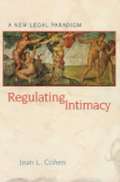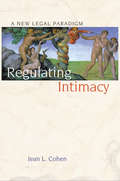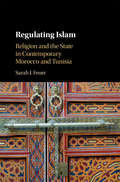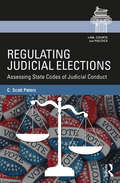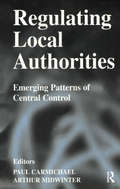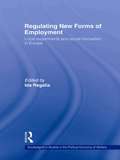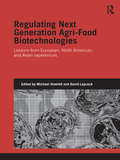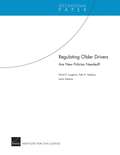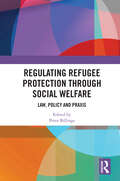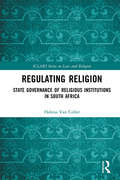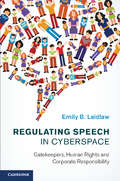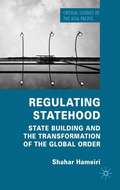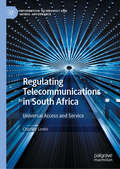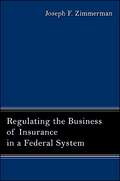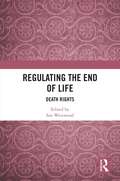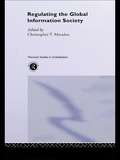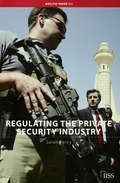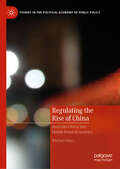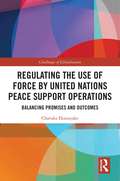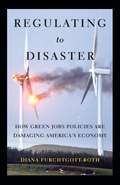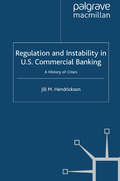- Table View
- List View
Regulating Intimacy: A New Legal Paradigm
by Jean L. CohenThe regulation of intimate relationships has been a key battleground in the culture wars of the past three decades. In this bold and innovative book, Jean Cohen presents a new approach to regulating intimacy that promises to defuse the tensions that have long sparked conflict among legislators, jurists, activists, and scholars. Disputes have typically arisen over questions that apparently set the demands of personal autonomy, justice, and responsibility against each other. Can law stay out of the bedroom without shielding oppression and abuse? Can we protect the pursuit of personal happiness while requiring people to behave responsibly toward others? Can regulation acknowledge a variety of intimate relationships without privileging any? Must regulating intimacy involve a clash between privacy and equality? Cohen argues that these questions have been impossible to resolve because most legislators, activists, and scholars have drawn on an anachronistic conception of privacy, one founded on the idea that privacy involves secrecy and entails a sphere free from legal regulation. In response, Cohen draws on Habermas and other European thinkers to present a robust "constructivist" defense of privacy, one based on the idea that norms and rights are legally constructed. Cohen roots her arguments in debates over three particularly contentious issues: reproductive rights, sexual orientation, and sexual harassment. She shows how a new legal framework, "reflexive law," allows us to build on constructivist insights to approach these debates free from the liberal and welfarist paradigms that usually structure our legal thought. This new legal paradigm finally allows us to dissolve the tensions among autonomy, equality, and community that have beset us. A synthesis of feminist theory, political theory, constitutional jurisprudence, and cutting-edge research in the sociology of law, this powerful work will reshape not only legal and political debates, but how we think about the intimate relationships at the core of our own lives.
Regulating Intimacy: A New Legal Paradigm
by Jean-Louis CohenThe regulation of intimate relationships has been a key battleground in the culture wars of the past three decades. In this bold and innovative book, Jean Cohen presents a new approach to regulating intimacy that promises to defuse the tensions that have long sparked conflict among legislators, jurists, activists, and scholars. Disputes have typically arisen over questions that apparently set the demands of personal autonomy, justice, and responsibility against each other. Can law stay out of the bedroom without shielding oppression and abuse? Can we protect the pursuit of personal happiness while requiring people to behave responsibly toward others? Can regulation acknowledge a variety of intimate relationships without privileging any? Must regulating intimacy involve a clash between privacy and equality? Cohen argues that these questions have been impossible to resolve because most legislators, activists, and scholars have drawn on an anachronistic conception of privacy, one founded on the idea that privacy involves secrecy and entails a sphere free from legal regulation. In response, Cohen draws on Habermas and other European thinkers to present a robust "constructivist" defense of privacy, one based on the idea that norms and rights are legally constructed. Cohen roots her arguments in debates over three particularly contentious issues: reproductive rights, sexual orientation, and sexual harassment. She shows how a new legal framework, "reflexive law," allows us to build on constructivist insights to approach these debates free from the liberal and welfarist paradigms that usually structure our legal thought. This new legal paradigm finally allows us to dissolve the tensions among autonomy, equality, and community that have beset us. A synthesis of feminist theory, political theory, constitutional jurisprudence, and cutting-edge research in the sociology of law, this powerful work will reshape not only legal and political debates, but how we think about the intimate relationships at the core of our own lives. .
Regulating Islam: Religion and the State in Contemporary Morocco and Tunisia
by Sarah J. FeuerMany countries in the Arab world have incorporated Islam into their state- and nation-building projects, naming it the 'religion of the state'. Regulating Islam offers an empirically rich account of how and why two contemporary Arab states, Morocco and Tunisia, have sought to regulate religious institutions and discourse. Drawing on a range of previously unexamined sources, Sarah J. Feuer traces and analyzes the efforts of Moroccan and Tunisian policymakers to regulate Islamic education as part of the respective regimes' broader survival strategies since their independence from French rule in 1956. Out of the comparative case study emerges a compelling theory to account for the complexities of religion-state dynamics across the Arab world today, highlighting the combined effect of ideological, political, and institutional factors on religious regulation in North Africa and the Middle East. The book makes an important and timely contribution to the on-going scholarly and policy debates concerning religion, politics, and authoritarian governance in the post-uprisings Arab landscape.
Regulating Judicial Elections: Assessing State Codes of Judicial Conduct (Law, Courts and Politics)
by C. Scott PetersState judicial elections are governed by a unique set of rules that enforce longstanding norms of judicial independence by limiting how judicial candidates campaign. These rules have been a key part of recent debates over judicial elections and have been the subject of several U.S. Supreme Court cases. Regulating Judicial Elections provides the first accounting of the efficacy and consequences of such rules. C. Scott Peters re-frames debates over judicial elections by shifting away from all-or-nothing claims about threats to judicial independence and focusing instead on the trade-offs inherent in our checks and balances system. In doing so, he is able to examine the costs and benefits of state ethical restrictions. Peters finds that while some parts of state codes of conduct achieve their desired goals, others may backfire and increase the politicization of judicial elections. Moreover, modest gains in the protection of independence come at the expense of the effectiveness of elections as accountability mechanisms. These empirical findings will inform ongoing normative debates about judicial elections.
Regulating Local Authorities: Emerging Patterns of Central Control
by PAUL CARMICHAEL; ARTHUR MIDWINTERBy examining the relationship between central governments and local authorities in a number of countries, the contributors to this study show how central governments exercise control and influence over the activities of local authorities.
Regulating New Forms of Employment: Local Experiments and Social Innovation in Europe (Routledge Studies in the Political Economy of the Welfare State)
by Ida RegaliaUsing a comparative framework, this new volume focuses on how non-standard employment can be regulated in very different social, political and institutional settings. After surveying these new forms of work and the new demands for labour-market regulation, the authors identify possible solutions among local-level actors and provide a detailed analysis of how firms assess the advantages and disadvantages of flexible forms of employment. The authors provide six detailed case studies to examine the successes and failures of experimental approaches and social innovation in various regions in the UK, France, Germany, Italy and Spain.
Regulating Next Generation Agri-Food Biotechnologies: Lessons from European, North American and Asian Experiences (Genetics and Society)
by Michael Howlett David LaycockAgri-food bio-technology policy and regulation is transitioning from an early period focused on genetic engineering technologies to ‘next-generation’ rules and regulatory processes linked to challenges originating in a wide variety of new technological processes and applications. Can lessons learned from past and current regulatory oversights of agricultural biotechnology – and other high-technology sectors – help us address new and emerging regulatory challenges in the agri-food genetics sector? The expert contributors in this volume discuss the experiences of a wide range of North American, European and Asian countries with high technology regulation to address four key questions related to the past and future development of agri-food genomics regulation across the globe. how unique is agri-food biotechology regulation, and how can it be evaluated using the existing tools of regulatory analysis developed in examinations of other sectors? is a ‘government to governance’ model of regulatory regime development found in many other sectors relevant in this rapidly evolving sphere of activity? is a stages model of regulatory regime development accurate? And, if so, at which stage are we currently positioned in the regulation of agri-food genomics products and technologies? what drives movement between stages in different countries and sectors? In assessing such drivers, what are the key links between sectoral (meso) developments and more general macro and micro developments such as international relations and administrative behaviour? By updating, extending and challenging earlier empirical and theoretical social science perspectives on agricultural bio-technological regulation, this volume helps to inform future policy formulation. It will be of interest to practitioners and students of biotechnology, agriculture, and science and technology policy, and regulatory processes more generally.
Regulating Older Drivers: Are New Policies Needed?
by David S. Loughran Seth A. Seabury Laura ZakarasAre older drivers posing increasing risk to the public? If so, what public policies might mitigate that risk? Older drivers (those 65 and older) are slightly likelier than drivers aged 25 to 64 to cause an accident, but drivers aged 15 to 24 are nearly three times likelier than older drivers to do so. The authors of this paper conclude that stricter licensing policies targeting older drivers would likely not improve traffic safety substantially.
Regulating Pharmaceutical Prices in India: Policy Design, Implementation And Compliance (India Studies in Business and Economics)
by Ajay BhaskarabhatlaThis book presents an extensive study on the effectiveness of recent regulations on pharmaceutical prices in India, exploring the weaknesses in the design and implementation of pharmaceutical price controls and investigating what can be done to fix the broken system.In addition, it examines the extent to which essential medicines are actually made affordable by price controls. The book argues that companies make the pharmaceutical price control regime largely ineffective by coordinating to increase pre-regulation prices; by diversifying horizontally away from the regulated markets and increasing prices in the unregulated markets; by manipulating trade margins; and by refusing to comply with the regulation because the penalties remains negligible.The book draws on extensive empirical research involving India’s 2013 Drug Price Control Order and widely-used medicines such as paracetamol and metformin to illustrate how firms have weakened regulation. It argues that the regulatory regime can be strengthened by using systematic analysis of product- and region-level data in the Indian pharmaceutical industry, and by screening for the strategies that firms currently employ to circumvent regulation. In closing, it discusses recent efforts to strengthen the implementation of price controls in India and expanding the scope of price controls to medical devices.
Regulating Private Military Companies: Conflicts of Law, History and Governance
by Katerina GalaiThis work examines the ability of existing and evolving PMC regulation to adequately control private force, and it challenges the capacity of international law to deliver accountability in the event of private military company (PMC) misconduct. From medieval to early modern history, private soldiers dominated the military realm and were fundamental to the waging of wars until the rise of a national citizen army. Today, PMCs are again a significant force, performing various security, logistics, and strategy functions across the world. Unlike mercenaries or any other form of irregular force, PMCs acquired a corporate legal personality, a legitimising status that alters the governance model of today. Drawing on historical examples of different forms of governance, the relationship between neoliberal states and private military companies is conceptualised here as a form of a ‘shared governance'. It reflects states’ reliance on PMCs relinquishing a degree of their power and transferring certain functions to the private sector. As non-state actors grow in authority, wielding power, and making claims to legitimacy through self-regulation, other sources of law also become imaginable and relevant to enact regulation and invoke responsibility.
Regulating Refugee Protection Through Social Welfare: Law, Policy and Praxis
by Peter BillingsThis book analyses the use and abuse of social welfare as a means of border control for asylum seekers and refugees in Australia. Offering an unparalleled critique of the regulation and deterrence of protection seekers via the denial or depletion of social welfare supports, the book includes contributions from legal scholars, social scientists, behavioural scientists, and philosophers, in tandem with the critical insights and knowledge supplied by refugees. It is organised in three parts, each framed by a commentary that serves as an introduction, as well as offering pertinent comparative perspectives from Europe. Part One comprises three chapters: a rights-based analysis of Australia’s ‘hostile environment’ for protection seekers; a searing critique of welfare policing of asylum seekers as ‘necropolitics’; and a unique philosophical perspective that grounds scrutiny of Australia’s policing of asylum seekers. Part Two contains five chapters that uncover and explore the lived experiences and adverse impacts of different social welfare restrictions for refugee protection seekers. Finally, the chapters in Part Three offer distinct views on human rights advocacy movements and methods, and the scope for resistance and change to the status quo. This book will appeal to an international, as well as an Australian, readership with interests in the areas of human rights, immigration and refugee law, social welfare law/policy, social work, and public health.
Regulating Religion: State Governance of Religious Institutions in South Africa (ICLARS Series on Law and Religion)
by Helena Van CollerThis book focuses on government regulation of religious institutions in South Africa. PART 1 explains the meaning of government regulation for religious communities by providing a brief overview of the relationship between church and state, the right to freedom of religion and the legal status of religious organisations. With reference to case examples, this section highlights the importance of religious autonomy and the right to self-determination of religious institutions and non-interference by the state in the internal affairs of the organisation. No fundamental rights are however absolute and the section concludes with a discussion on the limitation of rights and an overview of the relevant constitutional provisions and anti-discrimination laws in place relevant to religious organisations, in the context of equality and non-discrimination. PART 2 discusses in more detail the daily rights, responsibilities and freedoms associated with the right to freedom of religion within some specific spheres of society where regulation of religion has occurred or are necessary or has proved to be problematic. It includes those related to the role of religion in society; the relations between religion and state institutions; education; finance; family matters; employment law; planning law; broadcast media and general governance issues.
Regulating Speech in Cyberspace
by Emily B. LaidlawPrivate companies exert considerable control over the flow of information on the internet. Whether users are finding information with a search engine, communicating on a social networking site or accessing the internet through an ISP, access to participation can be blocked, channelled, edited or personalised. Such gatekeepers are powerful forces in facilitating or hindering freedom of expression online. This is problematic for a human rights system which has historically treated human rights as a government responsibility, and this is compounded by the largely light-touch regulatory approach to the internet in the west. Regulating Speech in Cyberspace explores how these gatekeepers operate at the intersection of three fields of study: regulation (more broadly, law), corporate social responsibility and human rights. It proposes an alternative corporate governance model for speech regulation, one that acts as a template for the increasingly common use of non-state-based models of governance for human rights.
Regulating Statehood: State Building and the Transformation of the Global Order
by Shahar HameiriShahar Hameiri argues that state building interventions are creating a new form of transnationally regulated statehood. Using case-studies from the Asia-Pacific, he analyzes the politics of state building and the implications for contemporary statehood and the global order.
Regulating Telecommunications in South Africa: Universal Access and Service (Information Technology and Global Governance)
by Charley LewisThis book provides the first full account of the 20-year story of universal access and service in South Africa’s ICT sector. From 1994 the country’s first democratic government set out to redress the deep digital divide afflicting the overwhelming majority of its citizens, already poor and disenfranchised, but likewise marginalised in access to telephone infrastructure and services. By this time, an incipient global policy regime was driving reforms in the telecomms sector, and also developing good practice models for universal service. Policy diffusion thus led South Africa to adopt, adapt and implement a slew of these interventions. In particular, roll-out obligations were imposed on licensees, and a universal service fund was established. But an agency with a universal service mandate was also created; and licences in under-serviced areas were awarded. The book goes on to identify and analyse the policy success and failure of each of these interventions, and suggests some lessons to be learned.
Regulating the Business of Insurance in a Federal System
by Joseph F. ZimmermanIn Regulating the Business of Insurance in a Federal System, Joseph F. Zimmerman provides an up-to-date historical description and analysis of the regulation of the business of insurance in the United States. He focuses on the controversial issue of whether Congress should authorize optional federal charters for insurance companies, thereby establishing a dual charter system superficially similar to the dual banking system. Reviewing the evidence between federal and state level regulation of the financial securities industry, Zimmerman finds that federal regulation falls woefully short of its state counterpart. He concludes that the current system, rather than the proposed dual insurance regulatory system, is the most efficient and effective.
Regulating the End of Life: Death Rights
by Sue WestwoodDeath Rights is a collection of cutting-edge chapters on assisted dying and euthanasia, written by leading authors in the field. Providing an overview of current regulation on assisted dying and euthanasia, both in the UK and internationally, this book also addresses the associated debates on ethical, moral and rights issues. It considers whether, just as there is a right to life, there should also be a right to death, especially in the context of unbearable human suffering. The unintended consequences of prohibitions on assisted dying and euthanasia are explored, and the argument put forward that knowing one can choose when and how one dies can be life-extending, rather than life-limiting. Key critiques from feminist and disability studies are addressed. The overarching theme of the collection is that death is an embodied right which we should be entitled to exercise, with appropriate safeguards, as and when we choose. Making a novel contribution to the debate on assisted dying, this interdisciplinary book will appeal to those with relevant interests in law, socio-legal studies, applied ethics, medical ethics, politics, philosophy, and sociology.
Regulating the Global Information Society (Routledge Studies in Globalisation)
by Christopher T. MarsdenAn outstanding line-up of contributors explore the regulation of the internet from an interdisciplinary perspective. In-depth coverage of this controversial area such as international political economy, law, politics, economics, sociology and internet regulation. Regulating the Global Information Society covers the differences between both US and UK approaches to regulation and establishes where policy is being made that will influence the future direction of the global information society, from commercial, democratic and middle-ground perspectives.
Regulating the Private Security Industry: Regulating The Private Security Industry (Adelphi series)
by Sarah PercyThe under-regulation of the private security industry has increasingly become a topic of media and academic interest. This Adelphi Paper enters the debate by explaining why the industry requires further regulation, and what is wrong with the current system. It begins by briefly defining the industry and explaining the need for more effective regulation, before analysing three types of regulation: domestic, international and informal (including self-regulation).
Regulating the Rise of China: Australia’s Foray into Middle Power Economics (Studies in the Political Economy of Public Policy)
by Michael PetersThis book revises the existing account of the first Rudd Government's engagement with China, placing Australian foreign direct investment screening policy at the centre of the story. At the time, the Rudd Government was accused of holding an unnecessarily interventionist approach to Chinese Sovereign-Owned Enterprise investments into the Australian mining sector. This book claims that the Australian Government had a deep and coherent understanding of the problem posed by Chinese investments that went well-beyond any simplistic 'China Inc.' or geopolitical threats. The key policymakers believed that the Chinese state-directed investments threatened the integrity of the liberal governance structures on which the Australian state is founded, and so Australian sovereignty itself. While the response of the Rudd Government was largely ineffectual, the logic underpinning it remains the best framework for guiding Australia's engagement with China into the 2020s, as well as the engagement of other liberal states coming to grips with China's rise.
Regulating the Use of Force by United Nations Peace Support Operations: Balancing Promises and Outcomes (Challenges of Globalisation)
by Charuka EkanayakeThis Book attempts to deduce regulatory standards that can close the gaps between the Promises made and the Outcomes secured by the United Nations in relation to its use of force. It explores two broad questions in this regard: why the contemporary legal framework relevant to the regulation of force during Armed Conflict cannot close the gaps between the said Promises and Outcomes and how the ‘Unified Use of Force Rule’ formulated herein, achieves this. This is the first book to coherently analyse the moral as well as legal aspects relevant to UN use of force. UN peace operations are rapidly changing. Deployed peacekeepers are now required to use force in pursuance of numerous objectives such as self-defence, protecting civilians, and carrying out targeted offensive operations. As a result, questions about when, where, and how to use force have now become central to peacekeeping. While UN peace operations have managed to avoid catastrophes of the magnitude of Rwanda and Srebrenica for over two decades, crucial gaps still exist between what the UN promises on the use of force front, and what it achieves. Current conflict zones such as the Central African Republic, Eastern Congo, and Mali stand testament to this. This book searches for answers to these issues and identifies how an innovative mix of the relevant legal and moral rules can produce regulatory standards that can allow the UN to keep their promises. The discussion covers analytical ground that must be traversed ‘behind the scenes’ of UN deployment, well before the first troops set foot on a battlefield. The analysis ultimately produces a ‘Unified Use of Force Rule’, that can either be completely or partially used as a model set of Rules of Engagement by UN forces. This book will be immensely beneficial to law students, researchers, academics and practitioners in the fields of international relations, international law, peacekeeping, and human rights.
Regulating to Disaster
by Diana Furchtgott-RothWhat is a "green job" anyway? Few can adequately define one. Even the government isn't sure, you will learn in these pages. Still, President Obama and environmentalist coalitions such as the BlueGreen Alliance claim the creation of green jobs can save America's economy, and are worth taxpayers' investment.But in Regulating to Disaster, Diana Furchtgott-Roth debunks that myth. Instead, energy prices rise dramatically and America's economic growth and employment rate suffer - in some states much more than others - when government invests in nonviable ventures such as the bankrupted Solyndra, which the Obama Administration propped up far too long.Electric cars, solar energy, wind farms, biofuels: President Obama's insistence on these dubious pursuits ultimately hamstrings American businesses not deemed green enough, and squeezes struggling households with regulations. Adding insult to injury: the technology subsidies Americans pay for solar panels, wind turbines, and electric batteries really help create manufacturing jobs in China and South Korea.Green jobs are the most recent reappearance of a perennial bad idea - government regulation of certain industries, designed to anoint winners and losers in the marketplace. Regulating to Disaster reveals the powerful nexus of union leaders, environmentalists, and lobbyists who dreamed up these hoaxes, and benefit politically and financially from green jobs policies. Unfortunately, there are more Solyndras on the horizon, and our economy is in no shape to absorb them.
Regulating Undercover Law Enforcement: The Australian Experience
by Brendon MurphyThis book examines the way in which undercover police investigation has come to be regulated in Australia. Drawing on documentary and doctrinal legal analysis, this book investigates how, in the space of a single decade, Australian law makers set out to regulate one of the most difficult aspects of police: undercover investigation. In so doing, the Australian experience represents a paradigm model. And yet despite its success, it is a system of law and practice that has a dark side – a model of investigation to relies heavily on activities that are unlawful in the absence of authorisation. It is a model that is as much concerned with the surveillance and control of police as it is with suspected criminal conduct.The book aims to locate the Australian experience in comparative perspective with other major common law jurisdictions (the United Kingdom, Canada and New Zealand), with a view to contrast strengths, similarities and weaknesses of these models. It is argued that the Australian model, at the pragmatic level, offers a highly successful model for regulatory structure and practice, providing a significant model for successful regulation. At the same time, the model that has been introduced raises important questions about how and why the Australian experience evolved in the way that it did, and the implications this has for the relationship between citizen and state, the judiciary and the executive, and broader questions about the protections offered by rights discourse and jurisprudence. This book aims to document the law, policy and practices that shape undercover investigations. In so doing, it aims to not only articulate the way in which the law regulates these activities, but also to move on to consider some of the fundamental questions linked to undercover investigations: how did regulation happen? By what means of regulation? What are the driving policy issues that give this field of law its particular complexion? What are the implications? Who gains, and who loses, by which means of power?The book offers unique insights into a largely unknown aspect of modern covert policing, identifying a range of practices, the legal framework, controversies and powers. By locating these practices in a rich theoretical context, informed by risk and governmentality scholarship, this book offers a legal and theoretical explanation of one of the most controversial forms of policing.
Regulating US Private Security Contractors
by Jovana Jezdimirovic RanitoThis book explores different aspects of the regulation of private security contractors working for governments. The author specifically examines the US, identifying the obstacles that have hindered US regulatory outcomes. Theoretical discussions, supported by conceptual analysis of Bourdieu’s Theory of Practice, are applied to analysis based on interviews with current and former employees of key stakeholders. By analyzing the political, bureaucratic, and organizational obstacles to the implementation of consistent and enforceable regulations, Jovana Jezdimirovic Ranito points to creative possibilities for future use of her conceptual framework.
Regulation and Instability in U.S. Commercial Banking: A History of Crises (Palgrave Macmillan Studies in Banking and Financial Institutions)
by Jill M. HendricksonThe historical response to bank crises has always been more regulation. A pattern emerges that some may find surprising: regulation often contributes to bank instability. It suppresses competition and effective response to market changes and encourages bankers to take on additional risk. This book offers a valuable history lesson for policy makers.
